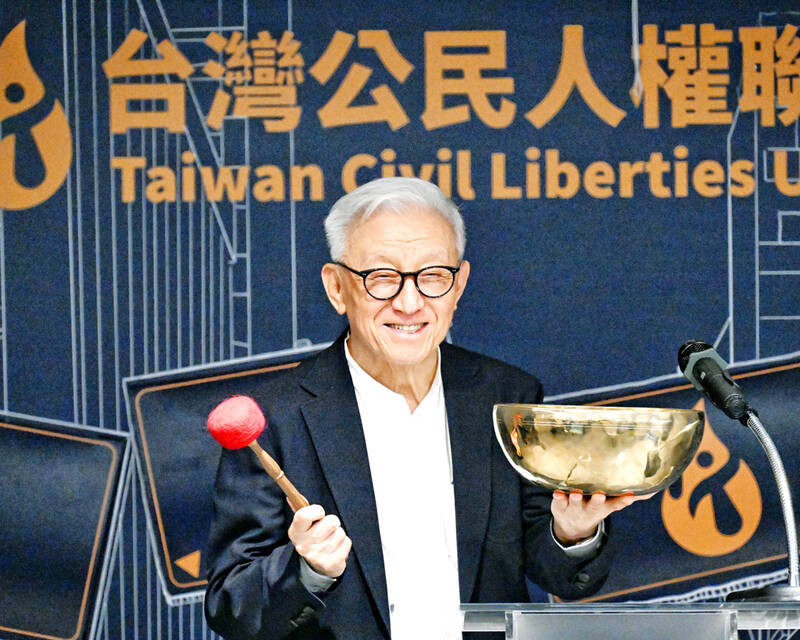Civil society must take the lead in judicial reform to shore up faith in a fair and just legal system, United Microelectronics Corp founder Robert Tsao (曹興誠) said at an event marking the launch of the Taiwan Civil Liberties Union in Taipei yesterday.
The backlog of cases, bad judgements and poor efficiency that persist in the justice system show that the government’s top-down efforts at judicial reform are more sound and fury than substance, he said.
The new organization — which takes inspiration from the American Civil Liberties Union — was created to consolidate human rights advocacy in Taiwan through a bottom-up social movement, he said.

Photo: Fang Pin-chao, Taipei Times
The low quality and inefficiency of the nation’s judiciary stem from an inappropriate trial structure, overreliance on prosecutorial authority in criminal investigations, criminalization of innocuous activities and lack of accountability of judicial officers, he said.
The Code of Criminal Procedure (刑事訴訟法) gives prosecutors power to appeal the result of a first trial, which renders the district court a toothless institution, Tsao said.
District court judges should be the main arbiters of criminal cases, and should have the power to dismiss meritless prosecutions with prejudice, he said.
Allowing prosecutors to try the same crime repeatedly contravenes Article 17 of the International Covenant on Civil and Political Rights and the double jeopardy principle of common law, while causing paralysis in the justice system, Tsao said.
The investigation and prosecution of crimes should be assigned separately to police and prosecutors according to principles of the division of labor and professionalism, he said.
Prosecutors lack the expertise to conduct investigations, unlike police, who have been trained in forensics and investigative techniques, he said, adding that requiring prosecutors to approve investigations adds red tape.
Many criminal offenses should be redefined as matters more appropriately governed by the Civil Code or legalized entirely, allowing police to focus on preventing and investigating serious crimes, Tsao said.
Libel should be treated as a civil offense to reduce unnecessary trials initiated by politicians that waste prosecutors’ and police resources, he said.
Perversion of justice by judges and prosecutorial abuse are breaches of Article 124 and Article 125 of the Criminal Code, but these laws are rarely invoked due to the reluctance of the justice system to regulate itself, Tsao said.
Entrusting the Ministry of Justice to reform itself was a mistake that stalled progress, and civil liberty advocates should focus on exerting legislative pressure, Tsao said.
The union would provide free legal counsel to the public in cases that concern civil liberties, and it would work with academics and lawmakers to promote positive change, he said.

CHANGING LANDSCAPE: Many of the part-time programs for educators were no longer needed, as many teachers obtain a graduate degree before joining the workforce, experts said Taiwanese universities this year canceled 86 programs, Ministry of Education data showed, with educators attributing the closures to the nation’s low birthrate as well as shifting trends. Fifty-three of the shuttered programs were part-time postgraduate degree programs, about 62 percent of the total, the most in the past five years, the data showed. National Taiwan Normal University (NTNU) discontinued the most part-time master’s programs, at 16: chemistry, life science, earth science, physics, fine arts, music, special education, health promotion and health education, educational psychology and counseling, education, design, Chinese as a second language, library and information sciences, mechatronics engineering, history, physical education

The High Prosecutors’ Office yesterday withdrew an appeal against the acquittal of a former bank manager 22 years after his death, marking Taiwan’s first instance of prosecutors rendering posthumous justice to a wrongfully convicted defendant. Chu Ching-en (諸慶恩) — formerly a manager at the Taipei branch of BNP Paribas — was in 1999 accused by Weng Mao-chung (翁茂鍾), then-president of Chia Her Industrial Co, of forging a request for a fixed deposit of US$10 million by I-Hwa Industrial Co, a subsidiary of Chia Her, which was used as collateral. Chu was ruled not guilty in the first trial, but was found guilty

Taiwan-based publisher Li Yanhe (李延賀) has been sentenced to three years in prison, fined 50,000 yuan (US$6,890) in personal assets and deprived political rights for one year for “inciting secession” in China, China's Taiwan Affairs Office spokesman Chen Binhua (陳斌華) said today. The Shanghai First Intermediate People’s Court announced the verdict on Feb. 17, Chen said. The trial was conducted lawfully, and in an open and fair manner, he said, adding that the verdict has since come into legal effect. The defendant reportedly admitted guilt and would appeal within the statutory appeal period, he said, adding that the defendant and his family have

DEADLOCK: As the commission is unable to forum a quorum to review license renewal applications, the channel operators are not at fault and can air past their license date The National Communications Commission (NCC) yesterday said that the Public Television Service (PTS) and 36 other television and radio broadcasters could continue airing, despite the commission’s inability to meet a quorum to review their license renewal applications. The licenses of PTS and the other channels are set to expire between this month and June. The National Communications Commission Organization Act (國家通訊傳播委員會組織法) stipulates that the commission must meet the mandated quorum of four to hold a valid meeting. The seven-member commission currently has only three commissioners. “We have informed the channel operators of the progress we have made in reviewing their license renewal applications, and